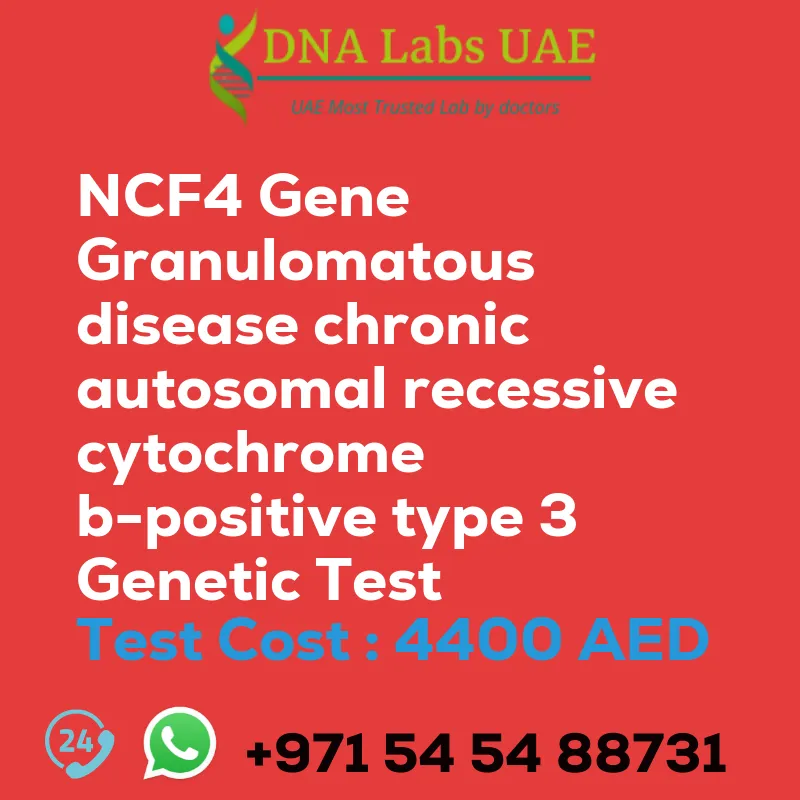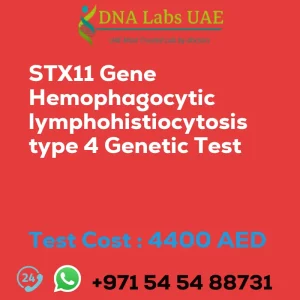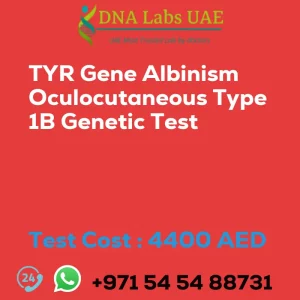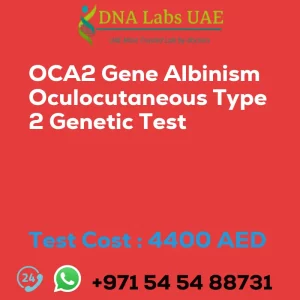NCF4 Gene Granulomatous Disease Chronic Autosomal Recessive Cytochrome b-positive Type 3 Genetic Test
Welcome to DNA Labs UAE, where we offer the NCF4 Gene Granulomatous Disease Chronic Autosomal Recessive Cytochrome b-positive Type 3 Genetic Test. This test is designed to provide valuable insights into chronic granulomatous disease (CGD) and its association with the NCF4 gene. Read on to learn more about the test components, price, sample condition, report delivery time, method, test type, and doctor information.
Test Details
The NCF4 gene is associated with a condition called chronic granulomatous disease (CGD), which is a rare genetic disorder that affects the immune system. CGD is characterized by recurrent and severe bacterial and fungal infections due to the inability of immune cells to effectively kill certain types of bacteria and fungi.
The NCF4 gene provides instructions for producing a protein called neutrophil cytosolic factor 4 (NCF4), which is a subunit of the NADPH oxidase enzyme complex. This enzyme complex plays a crucial role in the immune system by generating reactive oxygen species (ROS) within immune cells called phagocytes. ROS are important for the killing of bacteria and fungi that are engulfed by phagocytes.
Mutations in the NCF4 gene can lead to a deficiency or dysfunction of the NCF4 protein, resulting in a reduced ability of phagocytes to produce ROS. This impairment in ROS production makes individuals with NCF4 gene mutations more susceptible to infections, particularly those caused by certain bacteria and fungi that are normally easily killed by a healthy immune system.
Test Name: NCF4 Gene Granulomatous Disease Chronic Autosomal Recessive Cytochrome b-positive Type 3 Genetic Test
- Components: NGS Technology
- Price: 4400.0 AED
- Sample Condition: Blood or Extracted DNA or One drop Blood on FTA Card
- Report Delivery: 3 to 4 Weeks
- Method: NGS Technology
- Test Type: Osteology Dermatology Immunology Disorders
- Doctor: Dermatologist
- Test Department: Genetics
Pre Test Information
Before undergoing the NCF4 Gene Granulomatous Disease Chronic Autosomal Recessive Cytochrome b-positive Type 3 Genetic Test, it is important to provide the clinical history of the patient who is going for the test. Additionally, a genetic counseling session may be conducted to draw a pedigree chart of family members affected with NCF4 Gene Granulomatous Disease Chronic Autosomal Recessive Cytochrome b-positive Type 3 Genetic Test gene NCF4.
Importance of Next-Generation Sequencing (NGS) Genetic Testing
The diagnosis of NCF4 gene mutations and CGD can be confirmed through a Next-Generation Sequencing (NGS) genetic test. NGS is a high-throughput method that can analyze multiple genes simultaneously, providing a comprehensive assessment of genetic variations associated with a particular condition. In the case of CGD, NGS can identify mutations in genes such as NCF4 that are known to cause the disease.
It is important to note that CGD is a heterogeneous condition, meaning that mutations in different genes can cause similar symptoms. Therefore, a comprehensive genetic test that includes analysis of multiple genes associated with CGD is often recommended to identify the underlying genetic cause accurately.
Consultation and Medical Management
If you suspect that you or someone you know may have CGD, it is essential to consult with a healthcare professional or a genetic counselor who can guide you through the diagnostic process and provide appropriate medical management and treatment options.
At DNA Labs UAE, we are dedicated to providing accurate and reliable genetic testing services. Contact us today to schedule an appointment for the NCF4 Gene Granulomatous Disease Chronic Autosomal Recessive Cytochrome b-positive Type 3 Genetic Test.
| Test Name | NCF4 Gene Granulomatous disease chronic autosomal recessive cytochrome b-positive type 3 Genetic Test |
|---|---|
| Components | |
| Price | 4400.0 AED |
| Sample Condition | Blood or Extracted DNA or One drop Blood on FTA Card |
| Report Delivery | 3 to 4 Weeks |
| Method | NGS Technology |
| Test type | Osteology Dermatology Immunology Disorders |
| Doctor | Dermatologist |
| Test Department: | Genetics |
| Pre Test Information | Clinical History of Patient who is going for NCF4 Gene Granulomatous disease, chronic, autosomal recessive, cytochrome b-positive, type 3 NGS Genetic DNA Test. A Genetic Counselling session to draw a pedigree chart of family members affected with NCF4 Gene Granulomatous disease, chronic, autosomal recessive, cytochrome b-positive, type 3 NGS Genetic DNA Test gene NCF4 |
| Test Details |
The NCF4 gene is associated with a condition called chronic granulomatous disease (CGD), which is a rare genetic disorder that affects the immune system. CGD is characterized by recurrent and severe bacterial and fungal infections due to the inability of immune cells to effectively kill certain types of bacteria and fungi. The NCF4 gene provides instructions for producing a protein called neutrophil cytosolic factor 4 (NCF4), which is a subunit of the NADPH oxidase enzyme complex. This enzyme complex plays a crucial role in the immune system by generating reactive oxygen species (ROS) within immune cells called phagocytes. ROS are important for the killing of bacteria and fungi that are engulfed by phagocytes. Mutations in the NCF4 gene can lead to a deficiency or dysfunction of the NCF4 protein, resulting in a reduced ability of phagocytes to produce ROS. This impairment in ROS production makes individuals with NCF4 gene mutations more susceptible to infections, particularly those caused by certain bacteria and fungi that are normally easily killed by a healthy immune system. The diagnosis of NCF4 gene mutations and CGD can be confirmed through a Next-Generation Sequencing (NGS) genetic test. NGS is a high-throughput method that can analyze multiple genes simultaneously, providing a comprehensive assessment of genetic variations associated with a particular condition. In the case of CGD, NGS can identify mutations in genes such as NCF4 that are known to cause the disease. It is important to note that CGD is a heterogeneous condition, meaning that mutations in different genes can cause similar symptoms. Therefore, a comprehensive genetic test that includes analysis of multiple genes associated with CGD is often recommended to identify the underlying genetic cause accurately. If you suspect that you or someone you know may have CGD, it is essential to consult with a healthcare professional or a genetic counselor who can guide you through the diagnostic process and provide appropriate medical management and treatment options. |








